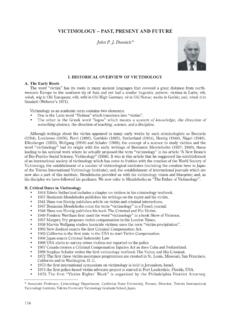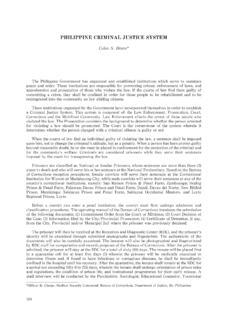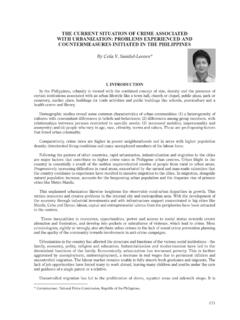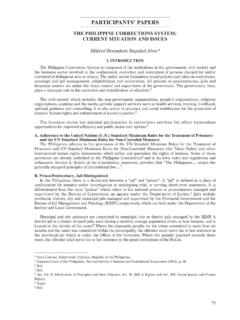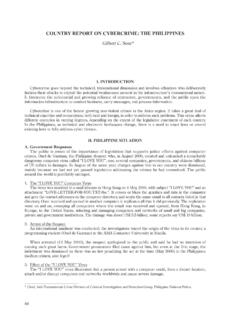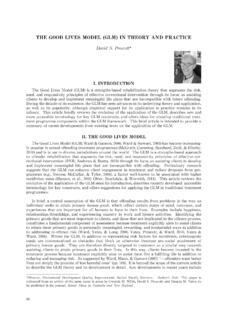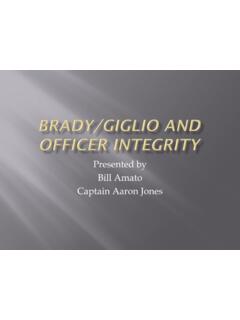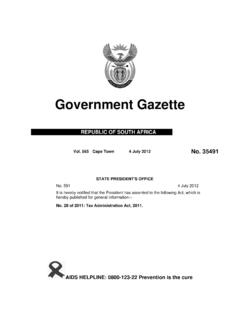Transcription of THE ROLE AND FUNCTION OF THE PROSECUTION IN THE …
1 272 RESOURCE MATERIAL SERIES No. 53* State Prosecutor II, National PROSECUTION Service,Department of Justice, criminal justice system, essentially,is the system or process in the communityby which crimes are investigated, and thepersons suspected thereof are taken intocustody, prosecuted in court and punished,if found guilty, provisions being made fortheir correction and to the advent of Americansovereignty in the country, we had theSpanish law on criminal procedure. TheRoyal Decree of September 4, 1884, byvirtue of which the Penal Code in force inthe archipelago, as amended in accordancewith the recommendations of the CodeCommittee, and its accompanying law the Provisional Law on CriminalProcedure were published and applied inthe Philippines pursuant to the RoyalDecree of December 17, 1884.
2 It becameeffective four months after its publicationin the Gaceta de Manila. In addition, thecompilation of the Laws of CriminalProcedure of 1879 and the Law of CriminalProcedure of 1882 also formed part of ourlaw on the the American occupation,General Otis issued General Orders No. 58on April 23, 1990, which was amended atvarious times. Some of the amendmentswere: Act No. 194, providing forpreliminary investigations; Act No. 440,relating to counsels de officio; Act No. 590,providing for preliminary investigations byJustices of the Peace of provincial capitals;Act No. 2677, prescribing the procedure ofappeals of cases originating in the JusticeTHE ROLE AND FUNCTION OF THE PROSECUTION IN THEPHILIPPINE criminal JUSTICE SYSTEMM enrado Valle-Corpuz*of the Peace Courts to the Supreme Court;Act No.
3 2709, regarding the exclusion ofan accused to be utilized as a governmentwitness; and Act No. 2886, changing thename of the party who should prosecutethe criminal action from that of TheUnited States to The People of thePhilippines. The Philippine criminal justice systemis composed of five parts or pillars, namely,law enforcement, PROSECUTION , judiciary,penology, and the LAW ENFORCEMENT PROCESSThe law enforcement consists of theofficers and men of the Philippine NationalPolice (PNP), the National Bureau ofInvestigation (NBI), and other they learn of the commission ofcrimes or discover them, their duty is the crime which may takethe form of surveillance and observationof suspects, other persons and premises;interviewing persons with knowledge offacts directly or indirectly connected withthe offense; taking photographs(surreptitiously or otherwise); arrangingfor entrapment.
4 Searching premises andpersons subject to constitutional andstatutory safeguards; and examining publicand other available records pertaining tothe persons involved and getting copies ofpertinent police officers, in other words, collectevidence for use in the PROSECUTION of thesuspects in the court. This may consist ofthe testimony of witnesses, includinginvited suspects, which are invariablytaken down in question-and-answer form;273107TH INTERNATIONAL TRAINING COURSEPARTICIPANTS PAPERS writings and objects, , gun, knife, otherweapons used in the commission of thecrime, clothing of the victim, suspects by virtue of a warrantof arrest issued by a judge on the basis ofevidence submitted by them or undercircumstances justifying a instances when an arrest withoutwarrant may be lawfully effected by a peaceofficer or a private person are as follows:(1) When in his presence, the person tobe arrested has committed, isactually committing or is attemptingto commit an offense.
5 (2) When an offense has in fact just beencommitted, and he has personalknowledge of facts indicating that theperson to be arrested has committedit; and(3) When the person to be arrested is aprisoner who has escaped from apenal establishment or place wherehe is serving final judgment ortemporarily confined while his casein pending or has escaped while beingtransferred from one confinement person who while in custody orotherwise deprived of liberty is underinvestigation for the commission of anoffense, has the following constitutionalrights, among others:1) He must be informed of his right toremain silent and to have competentand independent counsel preferablyof his own choice. If the personcannot afford the services of counsel,he must be provided with one.
6 Theserights cannot be waived except inwriting and in the presence ofcounsel;2) No torture, force, violence, threat,indimidation or any other meanswhich vitiate the free will shall beused against him; secret detentionplaces, solitary, in communicado orother similar forms of detention areprohibited; and3) Any confession or admission obtainedin violation of the foregoing shall beinadmissible in evidence against the case and the suspects tothe Office of the Public Prosecutor orMunicipal Trial Court for preliminaryinvestigation or directly to the MunicipalTrial Court for trial and PROSECUTION PROCESSThe investigation and PROSECUTION of allcases involving violations of penal laws arelodged with the Department of Justice(DOJ) through its National ProsecutionService (NAPROSS).
7 The DOJ is headed by the Secretary ofJustice with three Undersecretariesassisting from being the PROSECUTION arm ofthe government, the DOJ shall have thefollowing powers and as principal law agency of thegovernment and as legal counsel andrepresentative thereof, whenever sorequired; the probation andcorrection system; free legal assistance/representation to indigents and poorlitigants in criminal cases and non-commercial civil disputes; the integrity of land titlesthrough proper registration; and arbitrate untitledland disputes involving small landownersand members of indigenous culturalcommunities;274 RESOURCE MATERIAL SERIES No. immigration andnaturalization regulatory services andimplement the laws governing citizenshipand the admission and stay of aliens; legal services to the nationalgovernment and its functionaries,including government owned or controlledcorporations and their subsidiaries; such other FUNCTION as maybe provided by law.
8 It consists of thefollowing constituent units:(1) Department proper;(2) Office of the Government Counsel;(3) National Bureau of Investigation;(4) Public Attorney s Office;(5) Board of Pardons and Parole;(6) Parole and Probation Administration;(7) Bureau of Corrections;(8) Land Registration Authority;(9) Bureau of Immigration; and(10) Commission on the Settlement ofLand NAPROSS is with the DepartmentProper which is under the control andsupervision of the Secretary of Justice. Itis composed of the PROSECUTION Staff in theOffice of the Secretary of Justice headedby the Chief State Prosecutor, the RegionalState PROSECUTION Offices headed byRegional State Prosecutors, and theProvincial and City PROSECUTION Officesheaded by the Provincial Prosecutor andCity Prosecutor, PROSECUTION Staff or StateProsecutors perform the administrative chargesagainst prosecutors and other prosecutionofficers; the investigation andprosecution of all crimes; legal opinions on queriesinvolving violations of the Revised PenalCode and special penal laws.
9 Appeals from the resolutionsof prosecutors and other prosecutingofficers in connection with criminal caseshandled by State Prosecutors have thefollowing functions:(1) Implement policies, plans, programs,memoranda, orders, circulars andrules and regulations of the DOJrelative to the investigation andprosecution of criminal cases in hisregion;(2) Exercise immediate administrativesupervision over all Provincial andCity Prosecutors and otherprosecuting officers of provinces andcities comprised within his region;(3) Prosecute any case arising within and City Prosecutors have thefollowing the law officer of the province orcity, as the case may be. He shall havecharge of the PROSECUTION of all crimes,misdemeanors and violations of city ormunicipal ordinances in the courts of suchprovince or city and shall therein dischargeall the duties incident to the institution ofcriminal prosecutions; and/or cause to beinvestigated all charges of crimes,misdemeanors and violations of all penallaws and ordinances within their respectivejurisdictions and have the necessaryinformation or complaint prepared or madeagainst the persons accused.
10 In theconduct of such investigations, he or hisassistants shall receive the swornstatements or take oral evidence ofwitnesses summoned by subpoena for thepurpose;275107TH INTERNATIONAL TRAINING COURSEPARTICIPANTS commissions of criminalacts and take an active part in thegathering of relevant evidence. For thispurpose, the National Bureau ofInvestigation, Philippine National Policeand other offices and agencies of thegovernment shall extend to him thenecessary assistance; as legal adviser of themunicipality, and municipal district of theprovinces or the provincial or citygovernment and its officers or of the such, he shall, when so requested,submit his opinion in writing upon anylegal question submitted to him by anysuch officer or body pertinent to the dutiesthereof.
